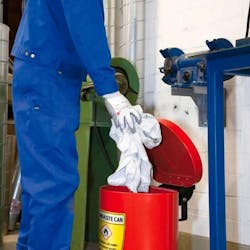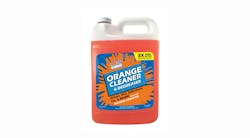In this article, you'll learn:
- How to increase fire safety in the shop through proper storage
- How to mitigate fire risks due to hot work
- What equipment will help your shop fight fires
For more on fire safety in the shop:
The list of potenial fire hazards in a shop environment goes beyond what may be common sense, and can include “electrical hazards like faulty wiring or overloaded circuits, flammable liquids like oils and solvents, built-up grease and oil residue, improper storage of combustible materials, and more, all of which can easily ignite when exposed to a heat source,” explained SeaRay Beltran, safety oversight consultant with PIRM Group International.
A rogue spark combined with any of these hazards could have devastating consequences. Proper storage of flammable chemicals and taking precautions when doing high-risk work like welding are some steps you can take to fire-proof your shop. We spoke to a few fire experts for some tips you can implement now to avoid disaster.
Safe storage
After knowing how many flammable oils, chemicals, and other liquids are commonplace around the shop, the first order of business is proper storage. Not only of the liquids themselves, but any rags, gloves, or other material that may be soaked in them. All of it is liable to catch fire.
This means that proper storage should be top of mind, especially when it comes to more hazardous materials like cleaners, solvents, or aerosol sprays. The first step is to know what could be a risk.
“It’s important to evaluate and determine the threat level,” explained Steve Eyer, engineering systems national sales manager at safety container provider Denios. “Any professional shop should have a materials manager familiar with what hazardous materials are on site.”
To make matters worse, sometimes fire can even occur without an external heat source.
“Unfortunately, these rags do create heat from chemical reactions between different chemicals, and that’s how fire starts,” Beltran explained. “Ensuring hazardous chemicals are segregated, stored in appropriate containers within designated areas, and accessible only to trained personnel” are all best practices.
Proper storage minimizes the risk of a fire igniting, but if it does, the goal is to keep it contained or prevent it from spreading rapidly.
Denios offers leak-proof and OSHA/NFPA-certified waste cans of various sizes meant to hold oily rags and other materials, keeping them contained and allowing for easy disposal away from potential heat sources.
“With each flammable and combustible liquid, the first line of defense is the primary container in which the material is stored,” Eyer noted. “Ensuring containers are sealed and closed while not in use or reducing storage quantities for high-risk areas are best practices.”
4 Steps to a fire-aware shop
- Make a plan: Have a comprehensive fire safety plan that includes procedures for regular inspections and emergency response protocols, and make sure all employees know about it.
- Train employees: All shop personnel should know basic fire prevention and response. This includes how to conduct inspections, recognize potential fire hazards, and use extinguishers.
- Maintain detailed records: Keeping track of all inspections, maintenance, and repairs can ensure that all necessary tasks are performed on schedule.
- Consult with professionals: Partner with fire services to conduct regular inspections, maintenance, and training.
Source: Preventing Vehicle Fires on Heavy Machinery: The Importance of Regular Inspections and Maintenance - Fire Systems, Inc.
Hot work
On top of the laundry list of flammable fuel items that exist in the shop, there is no shortage of heat and ignition sources. Hot work, which includes welding, cutting, grinding, and more, is especially high-risk, as it involves actively producing sparks and heat.
Between 2017 and 2021, the NFPA reported that U.S. fire departments responded to over 3,396 structure fires involving hot work resulting in $292 million in direct property damage, with welding torches being the most common equipment involved.
Timothy S. Cowan, Deputy Fire Chief, DeWitt Fire District in New York, mentioned that the key to mitigating risk associated with this type of work is to keep it in one place.
“I get there are times on vehicles that you have to do torch work or whatnot, but if you’re specifically welding things that are pieces and not on the vehicle, definitely do that only in certain areas,” he recommended, also mentioning that it can’t hurt to invest in barriers, fire blankets, and other precautionary measures specifically for these areas.
“Making sure that the area is clean of any potential fuel hazard that the sparks might wind up on is key as well,” agreed Capt. Mike Daley, chief training officer and fire officer with Fire Service Performance Concepts. “Keep everything away from the area where you’re working.”
Having designated high-risk work areas makes it easier to keep them clean of dirty rags and other combustibles, but again, perhaps the most important part of this is maintaining awareness.
“With hot work, it’s making sure that somebody’s paying attention to that after the fact,” Cowan continued. “‘Where did the sparks go? Are they cool? Should we just walk away from this?’ It’s being cognizant of the surroundings and what’s going on when they’re doing that type of work.”
As mentioned, painting, especially spray-painting in a booth, could be considered another high-fire-risk activity. Combustible paint fumes or particles can remain present in the air, especially with poor ventilation, which can create a dangerous environment.
Outfitting your shop
When it comes to equipping your shop with the right tools to combat fire, extinguishers are paramount. But not just any extinguisher. For example, Cowan recommended that a shop that does a lot of grinding and deals with metal shavings may want to opt for a Class D extinguisher, as they are designed specifically to fight fires involving combustible metals. According to Beltran, it doesn’t stop there.
“Beyond standard fire extinguishers, a shop should consider having fire blankets, fire hoses, smoke detectors, carbon monoxide detectors, heat detectors, fire suppression systems for specific areas (like kitchens), and signage clearly indicating the location of fire safety equipment to help prevent or mitigate fire damage,” he listed.
Spill kits are another consideration. Solvents or degreasers formulated specifically for cleaning oil, like the Oil Eater Orange Cleaner, can help prevent slips and falls while also eliminating a potential fuel source for a shop fire.
It’s also important to keep in mind any environmental factors like ventilation (or lack thereof) and humidity that can contribute to or exacerbate fire, and how to regulate these factors with proper shop construction.
While not all of these measures are necessary for every shop depending on size and other varying factors, it never hurts to be overprepared. And local fire departments can provide the most accurate preventative measures for your space.
About the Author

Lucas Roberto
Lucas Roberto is an Associate Editor for Fleet Maintenance magazine. He has written and produced multimedia content over the past few years and is a newcomer to the commercial vehicle industry. He holds a bachelor's in media production and a master's in communication from High Point University in North Carolina.


